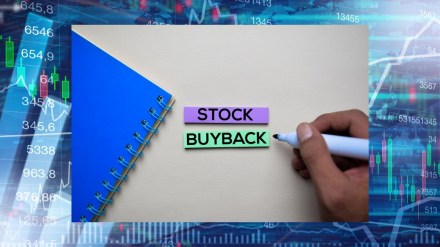The biggest-ever buyback announcement by Infosys has created quite a buzz. The Rs 18,000 crore buyback proposal is expected to support the Infosys price performance in the short term, as the IT sector stocks have been impacted by weaker growth across markets. This has also led to anticipation about other tech companies like TCS following suit.
Key market observers point out that though there is an expectation now, it may not be the case necessarily. According to Siddhartha Khemka, Head of Research, Wealth Management, Motilal Oswal Financial Services , “The buyback does have a positive rub-off impact on the whole IT industry. But if Infosys does, should TCS also follow suit? It’s not necessary. There is no doubt an expectation in the market, but that doesn’t mean that it’s sure to happen.”
5 factors to watch out for as market expectation of TCS buyback gains momentum –
CLSA on TCS buyback hopes
Close on the heels of the massive buyback announced by Infosys, international brokerage house, CLSA pointed out that India’s largest IT company by revenue, TCS, may also undertake similar buyback initiatives to build investor confidence. However, as per the CLSA report, the IT major from the Tata Group may opt for a tender offer kind of buyback amounting to nearly Rs 20,000 crore instead of a large dividend payout in Q3.
TCS buyback history
Till date, TCS has undertaken 5 share buybacks since listing. The first share buyback was in 2017, and TCS bought back shares worth Rs 16,000 crore at Rs 2,850 per share. There was another Rs 16,000 crore share buyback in 2018, followed by the next one in 2020 worth the same amount. The shares were bought at Rs 3,000/share in 2020.
After that, the next buyback was post-Covid. The company undertook two share buybacks in 2022 and 2023. The 2022 buyback was worth Rs 18,000 crore, while in 2023, the company conducted a buyback worth Rs 17,000 crore.
What historical trends suggest
Normally management undertakes buybacks to instill investor confidence and also as a show of strength and conviction in the company’s fundamentals. The aggregate value of the five share buybacks undertaken so far is about Rs 83,000 crore.
According to Siddhartha Khemka, “TCS is the largest IT company in India. They also have a history of buybacks, special dividends, and regular dividends that they continue to undertake at regular intervals. So after Infosys’ mega buyback announcement, there is an expectation from the market. I am not too sure, or I have no idea whether the company will do it, But if again they follow the similar thought process and strategy, they might as well come out with it.”
TCS: Growth projections for FY26
However, when one is considering buyback, one also needs to look at the fundamental business of the company. Overall, revenue growth in FY26 is expected to be much lower than in FY25 for most IT majors, including TCS.
TCS reported a revenue de-growth of (-)3.3% QoQ in Q1. Even on a year-on-year comparison, revenue growth has declined. Geography-wise, North America reported a decline of 2.7% YoY, but some recovery was seen sequentially in dollar terms due to cross-currency tailwinds. The UK and continental Europe both reported revenue decline.
The company’s discretionary spend continues to be under heightened scrutiny, and the new tariff order is adding further pain in select sectors. Spending on energy has reduced due
to policy changes and geopolitical tension, and BFSI is subdued in Europe and the UK.
This hit Q1 revenue. Most brokerage houses estimate a recovery starting in FY27, given the margin pressure due to the new BSNL deal.
TCS order pipeline in FY26
In terms of order pipeline, TCS kicked off FY26 with a robust order pipeline. The company has reported a TCV of $9.4 billion. This is up 13.2% YoY. According to the Indian IT major, “Agentic AI has taken centre stage, and it is now a core theme in client conversations.” They are optimistic that international revenue in FY26 will outperform FY25.
TCS share performance
The TCS share price has been higher, in sync with the rest of the IT sector stocks in the last few sessions. It is up nearly 3% in the last 1 week compared to the 9% cut over 3 months. The stock is down a massive 30% over the last 1 year, and even for 2025, the share price is down 23%.
